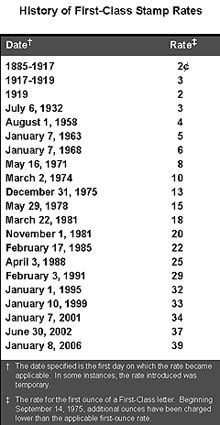PRC Decision a Big Win For Postal Customers, APWU
February 26, 2007
The APWU — along with individual customers and small businesses — achieved a significant victory Feb. 26, when the Postal Regulatory Commission announced its recommended decision on a USPS request to increase rates: The PRC rejected the Postal Service’s proposed rate structure, and instead endorsed an APWU suggestion to increase postage for individual first-class letters to only 41 cents, instead of 42 cents as the Postal Service requested.
[PRC press briefing packet - PDF]

The commission also echoed the APWU assertion that discounts for presorted mail should not exceed the costs that the Postal Service avoids when large mailers engage in “worksharing.”
Rejecting a USPS proposal to disconnect rates for single pieces from rates for presorted mail, the panel concluded, “de-linking” would abandon “the principle that worksharing discounts should be based on the costs avoided by worksharing activities.” The USPS proposal would have expanded discounts beyond that, and would have unfairly shifted the burden of this rate increase on to single-piece mailers, the panel found.
“This trifecta victory of the American Postal Workers Union is a win for every citizen of our country,” said APWU President William Burrus. “We have denied the large mailers further subsidization of their postage by individual mailers.”
“For more than a decade,” Burrus added, “the APWU has argued that excessive worksharing discounts rob the Postal Service of needed revenue, and undermine the fundamental mission of the USPS — to provide universal service at uniform rates.
“The APWU has been the lone voice of opposition to efforts by the mailing industry to keep their postage costs low, at the expense of the rest of the mailing public,” Burrus said. The APWU has long sought to reduce excessive discounts and was the only union to actively oppose the USPS rate proposal.
In testimony and briefs before the commission, the APWU condemned the proposal submitted by the USPS, saying it would shift postage costs from large corporate mailers to individual citizens and small businesses. [APWU Initial Brief to the PRC, Dec. 21, 2006 - PDF] [APWU Reply to the PRC, Jan. 4, 2007 - PDF]
In a report submitted to the PRC on behalf of the APWU, Kathryn Kobe, director of Price, Wage and Productivity Analysis for Economic Consulting Services, demonstrated that proposed discounts were considerably larger than the costs the Postal Service would avoid as a result of worksharing. [Kobe Testimony, Oct. 12, 2006 - PDF]
If the discounts were properly set, Kobe testified, postage for patrons who do not engage in worksharing practices (such as bar-coding, presorting, or drop-shipping) could be increased to only 41 cents per first-class letter instead of 42 cents. The increase to 41 cents was endorsed by the commission in its recommended decision.
The PRC wrote, “The Commission believes that mailers who workshare should be rewarded, and recommends discounts that fully reflect the costs avoided by worksharing.” However, “because the de-linking approach does not equitably balance the interests of all mailers within a subclass,” and does not follow established principles of rate design, “the Commission does not adopt it.”
The commission’s reasoning is significant, Burrus said. “Although the commission’s recommendation does not eliminate excessive discounts, it supports the principle which, under newly-enacted postal reform legislation, will require the Postal Service and PRC to justify worksharing discounts.”
“I applaud rate commission Chairman Dan Blair, Vice Chair Dawn Tisdale, and Commissioners Mark Acton, Ruth Goldway, and Tony Hammond for a courageous and correct decision,” Burrus said.
Union Campaign: ‘Organize More Women’
The APWU is beginning an aggressive campaign to organize more women postal workers.
In a proclamation on Feb. 13, the union’s National Executive Board noted that the membership of women in unions lags behind their representation in the workforce.
The proclamation pointed to the critical role of women in the labor movement and their “unique and powerful role” in the APWU, and called upon “union officers, activists, and members to engage in appropriate programs, ceremonies, and activities to accomplish this great undertaking” of increasing the APWU’s female membership.
With a launch set to coincide with Women’s History Month, the campaign will begin on March 1.



